Where are LA's World Cup plans?
I'm forever ranting about how little we know about LA’s Olympics plans. But we know literally nothing about LA’s World Cup plans. It's next year!

When I was in New Jersey last week, the conversation turned, as it often does, to megaevents. And New Jersey had just received some megaevent news: Jersey City will be hosting the continent's biggest fan fest site in Liberty State Park during next year’s World Cup. From the opening match on June 11, 2026, until the final, which is at MetLife Stadium on July 19, 2026, all 104 matches in the three-country, 16-city tournament will be broadcast here as a 39-day series of viewing parties against the Manhattan skyline. Another fan fest is in the works for New York's Central Park, plus a "takeover" of Times Square. So, this Jersey resident casually asked me, where are LA's fan fests going to be?
Imagine my embarrassment when I had to sheepishly admit to this soccer fan that LA hasn't announced any plans yet — even as our leaders keep going on TV to assure us that hosting the World Cup is key to our fire recovery. "We have the extra burden, excitement, opportunity of the World Cup coming," LA Mayor Karen Bass said on January 14, a week after the fires began. "And you know that prior to this tragedy, we were focused on getting ready for the world to come." California Governor Gavin Newsom specifically mentioned the World Cup as part of his "LA 2.0" vision. I'm forever ranting about how little we know about LA’s Olympics plans. But we know literally nothing about LA’s World Cup plans. It's next year!
Even though all the matches will be played at SoFi in Inglewood, LA is the host. FIFA has made fan fests part of hosting responsibilities since 2006, although, in our case, this agreement has not been made publicly available. (Come on, we're not Santa Clara!) These festivals have been touted by LA officials as a powerful equity tool; a way to include LA fans in the action without forcing families to shell out thousands for tickets. "This is primarily a local event, no matter how international it feels," says Victor Matheson, an economics professor at the College of the Holy Cross who studies World Cup impacts. "These will be popular and low-cost and basically pay for themselves through the sales of merch, food, and beer." Sounds like something that LA should be prioritizing, particularly when having multiple fan fests can boost the projected $594 million in economic impact of hosting the world's most-watched sporting event. But the problem is now we're competing with other LA-area cities for sponsorship money. And other LA-area cities are moving faster. West Hollywood has already announced a Pride House being hosted for the World Cup at The Abbey.
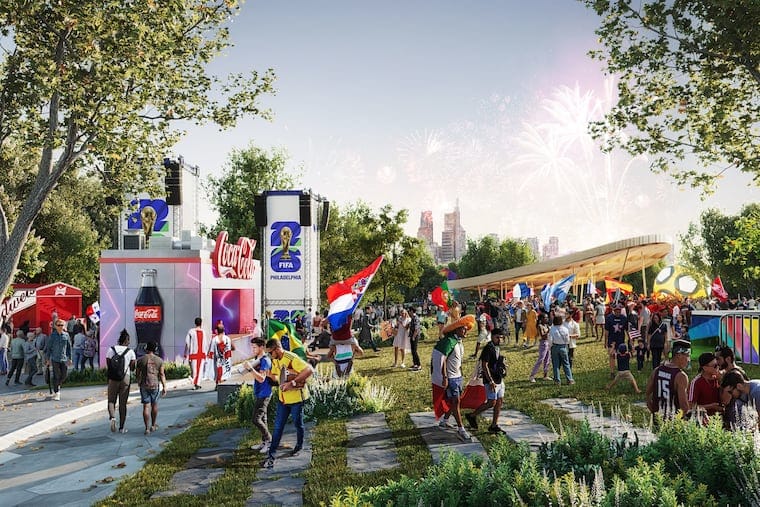
Officials are currently identifying places in every council district that might be converted into fan sites for both the World Cup and the Olympics. Last week, the council passed a motion that might accelerate this process, directing officials to draft a report on granting CEQA exemptions — you know, to build things for our "no-build" games — that would streamline approvals and permits, including "live sites and fan zones." One could argue the priority here might be to create a city list of projects, temporary or permanent, that might need to be built first. (Come on, we're not Long Beach!) But the motion, as passed, is only for Olympics and Paralympics infrastructure — the World Cup, starting in 462 days, was not mentioned.
At Friday's council meeting, councilmember and newly appointed Metro board member Imelda Padilla seemed exasperated with the holdups. "I feel like we are on the cusp of potentially losing all of the benefits that we could potentially get from the fact that we're going to be hosting the Olympics, because we keep having questions," she said. With only three years left, Padilla is concerned, and rightfully so, about preparations for the four Olympic events in the Sepulveda Basin, staged in what will all be temporary venues. A little more foresight here might have meant the city could plan temporary 2026 activations that flipped into temporary 2028 activations, with robust community input into which improvements neighbors might want these megaevents to leave behind.
Instead, the city is going to use CEQA exemptions to force through a bunch of decisions for 2028 while putting even less thought behind the decisions for 2026. Constituents are going to get mad because this will all seem thrown together at the last minute. And at this point, they're right. 🔥
Experiencing delays
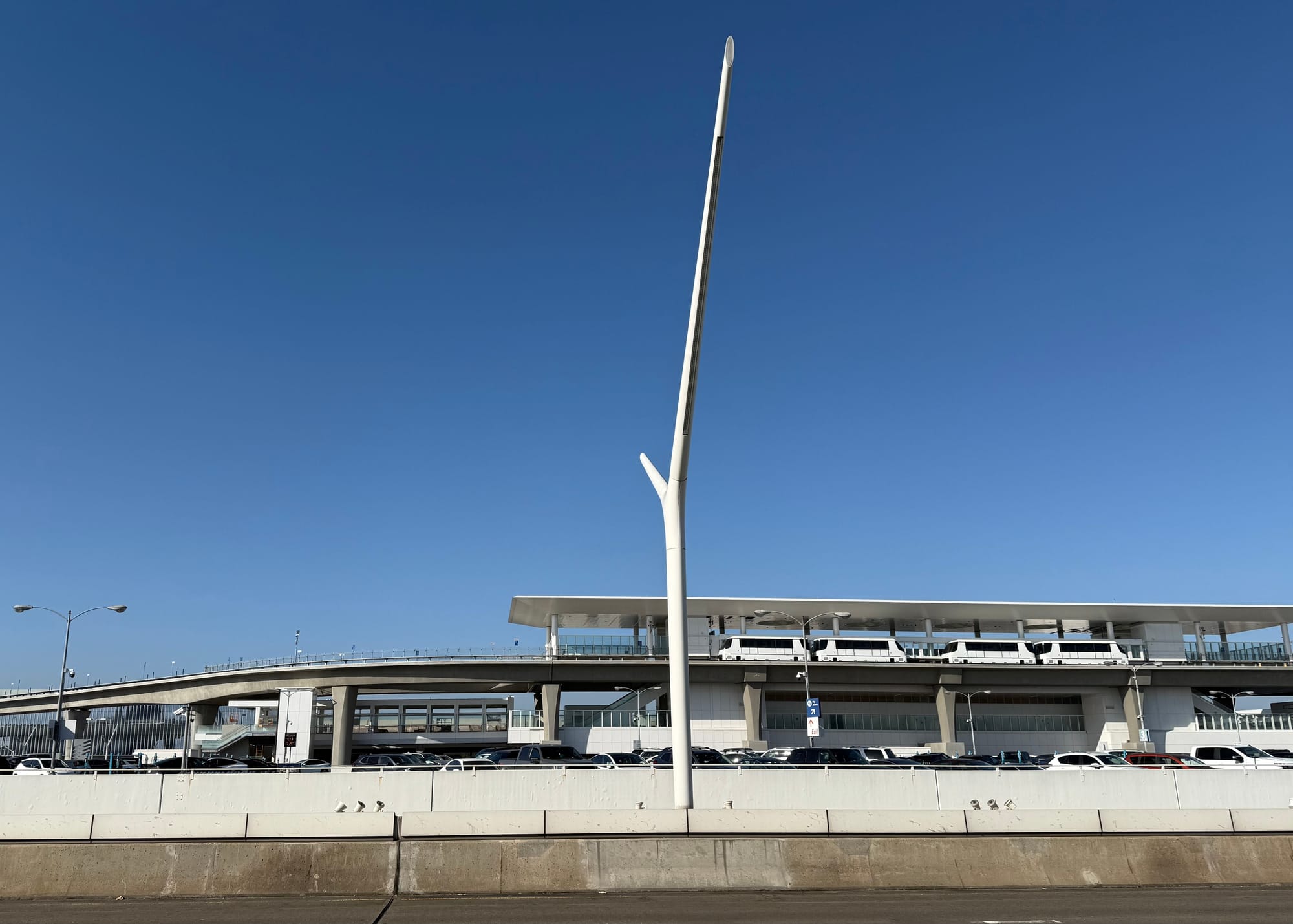
The Trump administration is putting U.S. megaevents in peril. In addition to the ongoing concerns that visas will not be issued in time for international spectators — wait times for countries like Colombia are currently over 700 days — a new report from the U.S. Travel Association is sounding alarms about airport security infrastructure: "We're not ready to host the upcoming mega decade of events that will draw millions of domestic and international travelers." LAX has doled out $5 billion in contracts to work on a long list of improvements ahead of 2028, including wayfinding, but the report also includes federal recommendations like "urgent modernization of air traffic control technology." Meanwhile, the State Department says its plan to deny visas to trans athletes will now be a permanent ban, meaning athletes attempting to enter the U.S. could face lifetime exclusion. A week later, Gavin Newsom appeared to revoke his own support of trans athletes. Now, thanks to our so-called leaders, we face both the growing possibility that no one will be able to get here — and the growing possibility that no one will want to come.
It's been one month since Newsom announced his fire-recovery dream team and there's still no information about what his trio of billionaires are planning to do. (Although Magic Johnson did star in a new LA tourism campaign — did you see the skywriting?) Newsom himself has been busy touting the state's megaevent dominance, with back-to-back NBA All-Star Games followed by back-to-back Super Bowls. Even the X Games are relocating to Sacramento! The whole campaign, and maybe Newsom's own personal political pivot, is meant to position California, and more specifically LA, as worthy of Trump's attention and dollars. "We are eternally grateful. And we are confident that if we work together, Los Angeles will continue to serve as a beacon to the world and securely place the city on solid ground in the coming years as it hosts the FIFA World Cup and Olympics — and thrive for the century to come," wrote Newsom while asking Congress for $40 billion in fire relief.
The 2028 games might close their sponsorship gap this year... or they might not, according to a single-source Los Angeles Times story quoting John Slusher, a former Nike exec and newish CEO of the U.S. Olympic and Paralympic Properties. At first the story says organizers are on track to raise a $2 billion out of a needed $2.5 billion in domestic sponsorships by the end of the year. Actually, in a real grimace-emoji moment, what Slusher actually says is that "business is just on fire." Yikes. Later in the story, however, Slusher admits that "things could turn the other direction too. So I think we’ll know a lot more in three months." One new sponsor was just announced: PennyMac was named "official mortgage supporter," in a deal that will include "meaningful engagement with U.S. Olympic and Paralympic athletes to provide education and support for homeownership." I'm old enough to remember when LA's organizing committee promised the games would leave behind 5,000 new units of housing.
LA28 is currently looking for production companies to bid for the 2028 opening and closing ceremonies — four total shows including both the Olympics and Paralympics. It's interesting timing because LA28 chair Casey Wasserman's company just acquired Bluemedia, a company that does live event production, and plans to rename it Wasserman Live later this year. Maybe they'll apply for the LA28 job? Or perhaps LA28 will hire one of Wasserman's Hollywood contacts. When Wasserman went to Mar-a-Lago, he was joined by Brett Ratner, the Rush Hour director who was accused of sexual misconduct by six women. Ratner is currently working on a biopic of Melania Trump for Amazon.
🎫 A new state bill, AB 1237, would authorize Metro to add up to $5 per ticket for World Cup or Olympics tickets and give ticketholders unlimited transit access during the games (as always, follow @numble)
💰 TransitCenter, the smartest transit advocacy organization in the country, announced a 12-year spend-down of its $69 million endowment "amid increasing risks to public funding and growing pressure on critical services." A truly incredible display of leadership
💸 LA is set to end the current fiscal year with a revenue shortfall, and revenues next year will decrease again, according to an alarm-ringing letter from Controller Kenneth Mejia. Seems bad!
🚌 Here's one idea: New York City's tremendously successful congestion pricing program has brought in $48.6 million for transit improvements in its first month
🏄♀️ Surfing venues for 2028 have narrowed to Lower Trestles or the Huntington Beach Pier, according to Surfer. Still no decision from Santa Monica on beach volleyball
💼 Over at The Sports Examiner, Rich Perleman reports that LA28's staff is up to 250, with more to come, as the organizing committee is hiring for dozens of positions
🎥 A Michael Bay-directed ad for Secret Service recruitment aired on the Jumbotron during the Super Bowl, bloody Trump ear and all. One reason the Secret Service needs to staff up is because it's the lead security agency for LA's upcoming megaevents. Funny that DOGE determined a $2.5 million Super Bowl ad for the Census to be government waste, but a $2 million Secret Service ad is just fine!
⚖️ SAJE is suing six landlords accused of rent-gouging. Plus, a new report by Better Neighbors LA tracks short-term rental hosts accused of gouging (your regular reminder that Airbnb is a global IOC sponsor)
🏘️ The results of listening sessions from fire recovery nonprofit Department of Angels are worth reading: 9 out of 10 residents of Altadena and Pacific Palisades are still unable to live in their homes, and "Angelenos overwhelmingly support policies that would streamline the rebuilding process and create more housing across the county." Emphasis mine
🖼️ On April 1, Sandra Jackson-Dumont is stepping down as director of the Lucas Museum, which recently pushed back its opening to 2026. The museum is meant to be a centerpiece of a revitalized Expo Park in 2028, as I discussed with Jackson-Dumont last year, but that process is going very slowly
🏞️ Los Angeles County Regional Park and Open Space District is creating 623 acres of new green space thanks to Measure A, which LA County voters passed in 2016
🛝 If you live in LA city, join a park needs assessment meeting to give input on what you want to see in your local green spaces
🚸 Perhaps some inspiration from New York City: a new report on reshaping neighborhoods for NYC youth
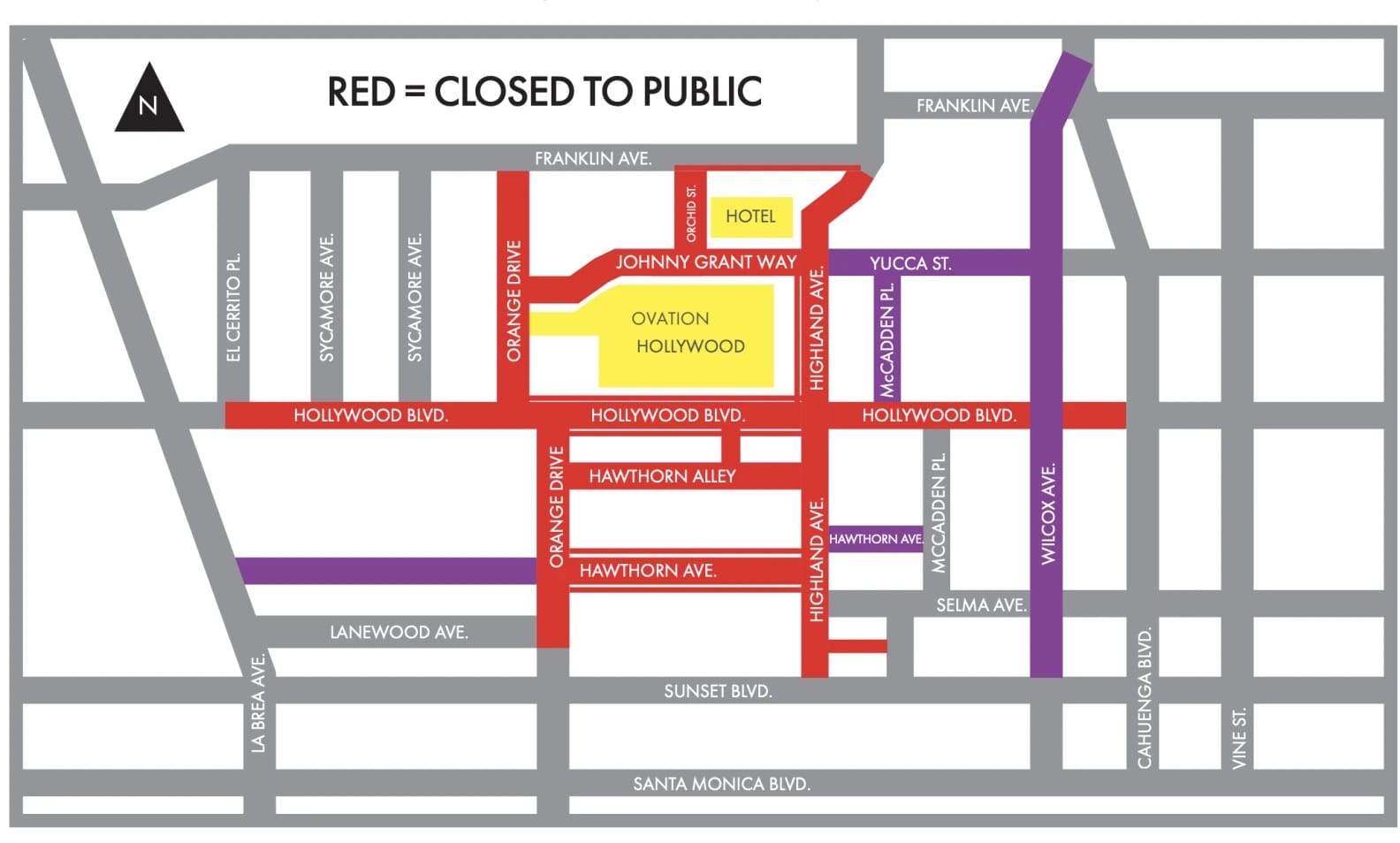
Awards season is finally over, and so is our window into what LA life will be like in 2028. With the ever-expanding security perimeters of the Oscars now beginning an astonishing one month before the show, there was a weird rumor this year that security was extra tight because Kamala Harris was going to be a presenter. But as someone who lived nearby for a few years and had to walk through a metal detector to go to the farmers market, it seemed like the typical heavily militarized disruption. (Although it was way worse when Metro handed over Union Station to the Academy.)
While Hollywood street closures happen year-round for film premieres — during some months the boulevard is closed more than it's open, making traveling there completely unpredictable — the Oscars are exceptionally rough. The Hollywood/Highland station is closed on the day of the awards, with B line trains bypassing the stop. Transit riders working the show as well as TAP-toting guests like Ed Begley Jr. must walk from the Vine Street station a mile away. My only question is: if Metro officials can't secure a rail station for the Oscars, how do we know that rail stations near venues won't be closed for the Olympics? Begley didn't document a trip to the awards this year, so listen to his interview on changing LA's transportation culture on The War on Cars instead.
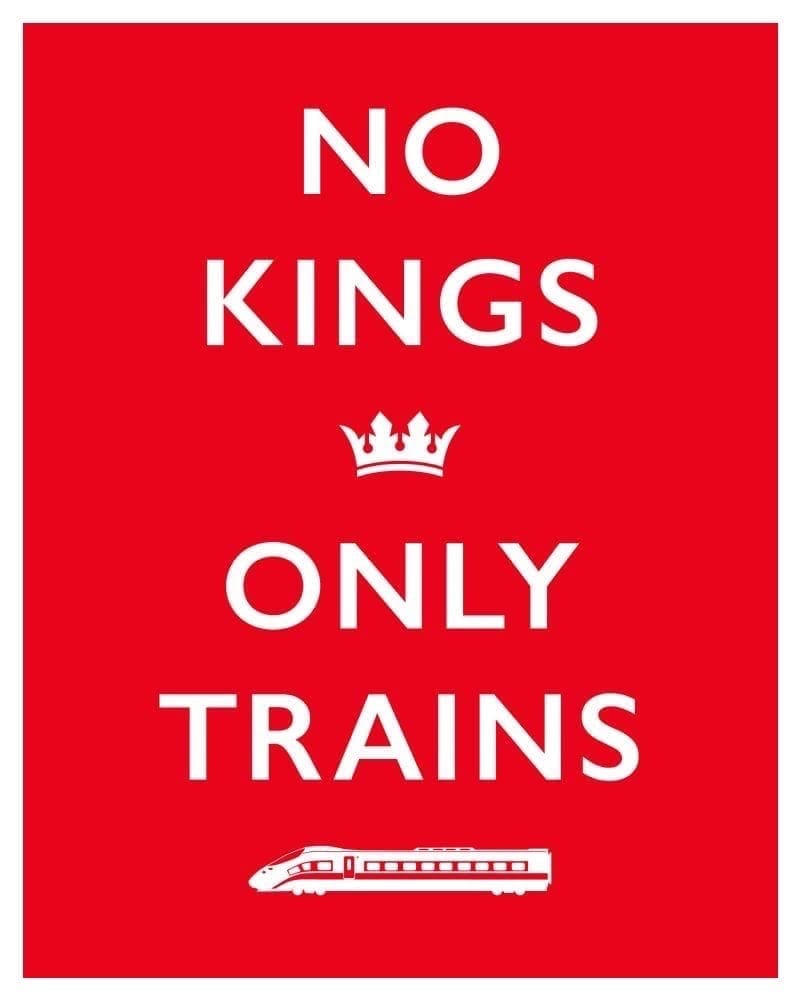
What Torched subscribers are reading
Once again I have selected for you a long list of the best LA stories to read and share, hand-picked, without any help from AI...
- "That glimmer of hopefulness that Octavia Butler seeded in the chaos of the Parables is rooted in adaptability. Change was inescapable; it could be destructive, it could be leveling, but to go forward, constructively, together, meant moving with grace and compassion." My fellow perambulist Lynell George traces the Altadena burn scar for the Sierra Club's magazine
- The race to save Altadena's historic fireplace tiles
- "When catastrophic fires still burned across this vast metropolis, local leaders pledged they would respond with one voice, sharing a mission as they steered the region through a complex recovery process." A thoughtful Washington Post story by Maeve Reston and Reis Thebault about LA's ongoing inability to get it together — including a quote from me
- Do urban water supply systems put out wildfires? Something that people spearheading "recovery" efforts might want to read, featuring past Torched Talks guest Greg Pierce from UCLA's Luskin Center for Innovation
- Experts warned against building homes on the Rancho Palos Verdes bluff named Portuguese Bend. Now hundreds of homes are sliding into the ocean. What a good lesson right here in LA County about not putting homes in dangerous places, but one that officials are totally ignoring post-fires
- Related: LA is already getting its fire recovery wrong
- Jason Wise calls out something that's been bothering me, too: Dodgers owner Mark Walter, who is supposedly leading the LA Rises initiative, still hasn't divested the team from the fossil-fuel industry that exacerbated the fires
- "With a signature, Landry gave himself the authority to 'control the movement of persons' within a certain area, making sure to note that he might need to set up 'emergency temporary housing' for unhoused people camped near the stadium." How abusing state emergency powers sent 100 homeless people to an unheated warehouse while New Orleans hosted the Super Bowl
- And more from New Orleans by Jack Lubin for the Los Angeles Review of Books: "Throughout the city, business owners report slower sales than could possibly have been expected. The Super Bowl, it turns out, is an engine of prosperity predominantly for the corporations doing their advertising and the handful of local, physical spaces lucky enough to be bought out by them"
- How Trump, the first sitting president to attend the Super Bowl, used the game as propaganda
- "Ever since the state’s voters capped property tax rates by passing Proposition 13 almost a half-century ago, California has embraced the idea that growth must pay for itself. But 'Growth must pay for itself' often winds up meaning that 'Growth must pay for us too.' So when population growth stops, everybody has to pay more." Even more reasons to hate Prop 13
- I love LA Taco reporter Janette Villafana's ongoing coverage of new food carts that are being co-produced with the county to help street vendors. These will look beautiful all over LA!
- And a general reminder that I've got a list of Torched-recommended books up at Bookshop (where I earn a small commission if you buy one). Just added: The Pacific Circuit: A Globalized Account of the Battle for the Soul of an American City by my dear friend Alexis Madrigal, which pairs well with Oil Beach: How Toxic Infrastructure Threatens Life in the Ports of Los Angeles and Beyond by Christina Dunbar-Hester
Listen up
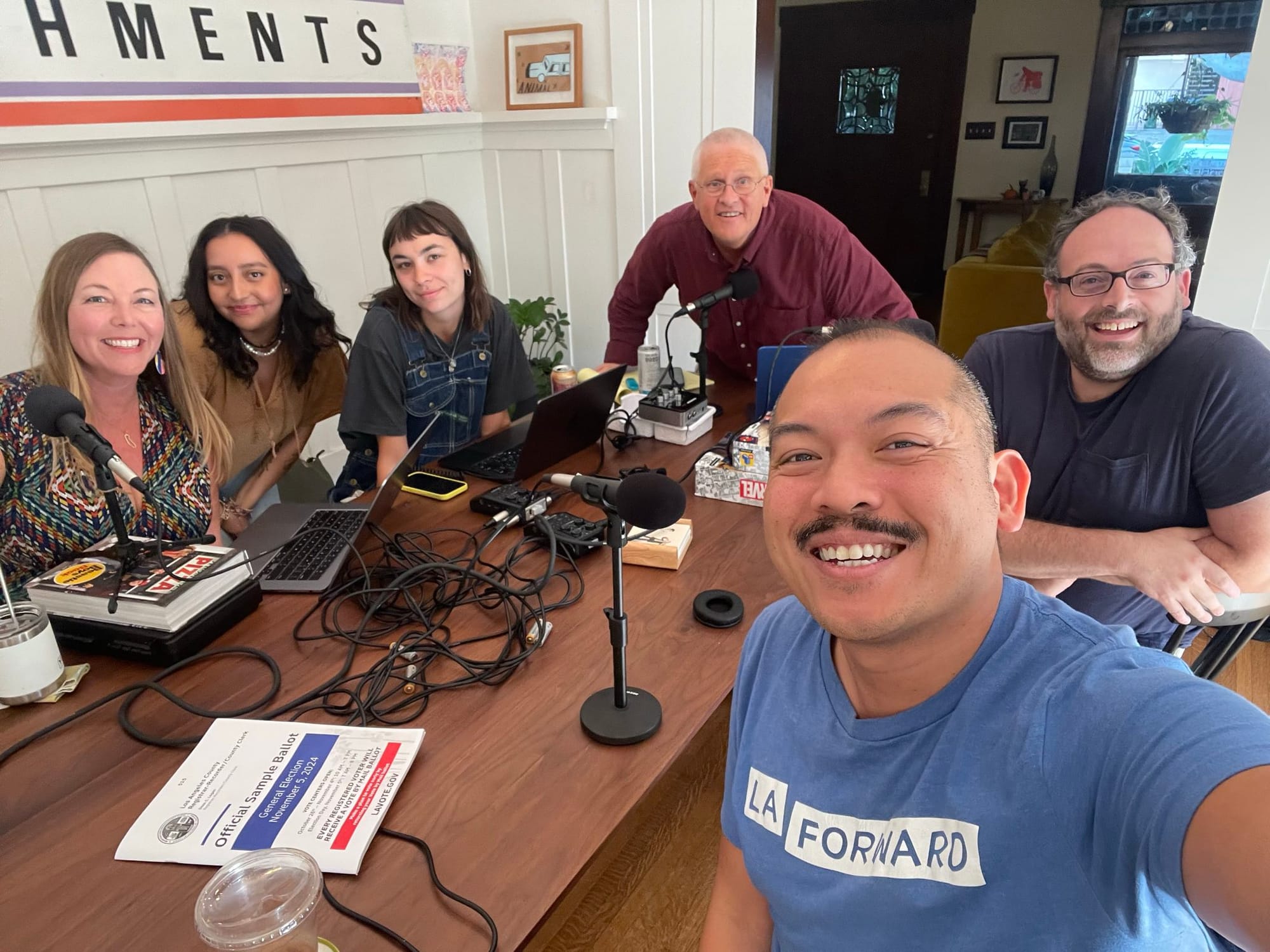
As you've probably heard, I co-host a local politics show called LA Podcast, and with the barrage of post-fire news, we're back to putting out weekly shows thanks to the support of LA Forward. This allows us to really get into the weeds of important issues like the Great Billionaire Battle to Rebuild LA™, a city charter reform effort that's on life support, which local leaders have connections to Elon Musk, and the ongoing beef between the mayor and the now-former fire chief. You can subscribe (there are links at the bottom of every episode) and follow @thelapod on Instagram where you can hear and share show clips. And you can always share feedback with us through our listener survey. If that's not enough of me, I also talked about the Dodger Stadium gondola as part of a fantastic panel for the Huntington USC Institute for the West; thanks to Bill Deverell for putting together such a good program.
I learned so much at last month's Torched Talks with Susie Cagle; watch it here. Next up is megaevent researcher Cerianne Robertson, who will be joining me Monday, March 17 for a talk about stadiums and displacement, narrative trends in Olympics coverage, and, of course, the twin menaces of sportswashing and greenwashing. It is, after all, St. Patrick's Day. See you then!





